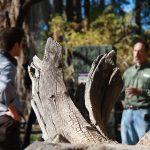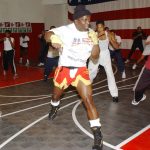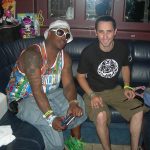Interview: How To Become an Art Museum Director
I’m Susan Krane. I’m the director of the Scottsdale Museum of Contemporary Art. The museum is a contemporary art museum. We show contemporary art, architecture, and design. We have a really active program of exhibitions. We also do casual gallery talks, big art parties, classes on interesting topics. Career workshops for teens who are interested in the arts. We serve a huge wide range of the public. Our audience is really interested in ideas that are creative and they think of themselves of creative thinkers and they are interested in looking at the world in a new way.
The director does tons of stuff at the same time in as short a time as possible. I do everything from strategically shaping the program to writing and curatorial work on a periodic basis. I launch programs and raise as much money as I can to make the museum happen. Mainly, making the museum go and grow.
When I was 18, time didn’t seem quite so tight. I was getting ready to go to college. I had grown up on the Art Institute of Chicago, thinking that everything in the art institute was partly mine. Because I could go and see it anytime. I took classes there as kids. My parents let us take commuter trains by ourselves and go take classes at the art institute. It was phenomenal. Even as a kid, looking at something someone made 400 years ago and really connecting with the fact that someone was communicating with you through this object they’d made with their hands was really special.
Art History was a way of looking at these amazing, visual objects. Many of us are very visual. Look at the web. It’s all through images and pictures.
Aren’t we all lost in college? Aren’t you supposed to be lost in college? I’m not sure if you’ve gone to college if you haven’t gotten lost at some point. The whole process of college is one of getting lost and finding things.
Backasswards?
The time I think I was most lost was when I got out of school. I remember thinking about what I was going to do to earn money. You just piece it all together.
There were a couple points of not knowing what was coming next. I kind of like knowing what’s coming next so I can do whatever I want in the interim.
Prestige is not enough. It means that if you work in a non-profit, you don’t do it for the money. We made these t-shirts saying that ‘prestige is not enough’ when we were working at this museum in Buffalo, New York. This museum has one of the best collections in the entire world. It was during an era of recessionary time and budget cuts. Everyone thinks it is so glamorous to work in a museum. You get to meet famous artists, you go to fancy dinners and there’s all this black tie stuff. But I started out in museums making under $10k a year. That was better than other internships that only paid $4k. We had these t-shirts made that the whole prestige of it is not enough. They were gold letters on a black t-shirt. It was a bit of parody to say that there are other paybacks for non-profits.
All of those people who want to work for VC and private equity firms a year ago is about prestige and power as well as the money. There was a stage that were four or five young lawyers that would come knock on my door and want to talk to me about trying to do something else. They had great training and great skills but were at that stage in their careers where they weren’t sure if it was a good fit for their personalities. There are some people who should be on the front lines in non profits, and there are people who need to be in for profit businesses. You need the whole spectrum. People don’t need to toss in the towel on professions they’ve dead ended on. It’s a matter of how to use your skills and resources for all kinds of good.
Our self made habits can be a blinder for appreciating contemporary art. If you expect art to be a painting in a frame on the wall, or a sculpture to be something that sits on a pedestal, or art to be something that is all about technique, or representational, you’re expectations aren’t going to be met when you look at contemporary art. Art has not been like that for decades. Artists work outside all of those parameters.
There are people that come to look at art thinking that it’s about being curious and it might be beautiful, and it might be challenging intellectually. They might leave with more questions than they came with. That’s a good thing. That’s what makes us grow and find other possibilities. Those are some of the habits that can get in the way. That you expect art to look a certain way. Or you only think art does one thing. Or you’re only interested in looking at art that’s been validated by the history or by market. That the prestige of the marketplace is what makes you care about.
It took the American public a good 150 years to appreciate Monet. And now we’re trying to get them past the whole there is life after Monet. I would like people to come to SMOCA with the idea that they’re a tourist. With that notion that when you travel, your senses are tuned in and you’re really curious and open to new experiences.
I think the question with any job, there’s always a tradeoff. It’s not all what you want to do. Is the part of the job that gives you what you really want to do that feeds your soul, does that balance out the part that’s the grunt work? The work that you just do to do. That changes as you go through your life. You have to figure out how to put the most energy to the part of it that feeds you the most. And how to recognize that.
There are days where the grunt work is 70% of what I’m doing. It’s really important then to keep in mind what’s really meaningful. And remember that. Our perceptions can be so clouded by recency. You forget that two days ago some really cool thing happened that is showing you the impact you’re having on an organization. Just your own sense of your productivity is not just how much money you’re making or how many sales you’re booking, but that part of it that’s a real payback. Where you help someone do something.
What’s meaningful for me changes day to day. What was meaningful today is that it’s the end of our fiscal year. So it’s a high pressure time. Just nuts. Our fundraising comes in at a very short time period. This year, even shorter and harder because of the economic situation. So I’m looking at our year end projections four times a day. I’m looking at our revenue balance to see how we come in the black. Just hourly. I’m on the phone trying to close deals and confirm pledges. We got an expected letter in the mail today that was a $10,000 gift from a foundation that we had not applied to and knew nothing about. The gift was in honor of one of our tour guides and their parents in recognition of how important the tour guides are to the museum. That was such a payback.
To me that shows that we’re building a family of the museum and everybody is contributing to what that is. It just felt great. We were all standing around reading this letter and virtually in tears because it was so special.
To relax a little bit more. To not judge quite as much. Set a direction and let things happen organically.
Art does so many things for me. Art is like constantly being in school. Dealing with a new project, dealing with a new artist, and learning about a whole new world. We were just in here talking about the programming for one of our fall shows. One of the programs that was talked about was on fiber optics. Do I know anything about fiber optics? No way. Would I otherwise have the chance to learn very much? No.
There’s only so much interest that exists within our heads. Other interests come from creative fields.
How do you benchmark your own progression?
It’s not that subjective. If you sit on a panel that determines what’s the most valuable piece of art that should get a grant or an award, there’s a lot of consensus from people. I’ve been looking at work for over 35 years. You develop this knowledge bank and you bring that.bear. Some of it you can articulate and some of it you can’t. I also know that when it gets to a certain point, my perceptions are not as accurate as my younger staff.
In terms of judging your own success, that changes. There’s a point where I left being a part of very prestigious, established museums. I did that for personal reasons. It was a very easy decision when I did that.
I don’t think I got out of my sweatpants for three months because all of a sudden I wasn’t in a big prestigious museum with a fabulous collection with all the collateral that automatically brings you.
I did that for five years. I learned that what’s valuable in work doesn’t come from those externals. You gain a freedom in the momentum of your own mind when you’re outside of a less codified or institutional situation. That’s been something that’s very important to me.
So I don’t want to be the next director of a $25 million budget museum. I don’t wan that hierarchy. I don’t want that distance from the artists and the real stuff. You get to a point where you see what’s really important to you. It comes down to the prestige and the nature of the work you’re doing and the nature of the people you’re working with. It’s a balance.
I think different people need different things at different times. When you make tradeoffs at different times there are things you can juggle. It’s not all in your control. There are people that want to the family thing when they’re in their twenties. It’s hard to predict, but you have to know what you want, even though you don’t always get what you want.
Sure, Denver has a big airport. I can make that work. That was my analysis. I didn’t put anything on a spreadsheet to analyze it. I just did it. Sometimes you just do things like that and you just know.
When you make a decision, it doesn’t mean you’re being analytical, or wacky, or crazy. It doesn’t mean that you don’t have a goal or a strategy in mind. It just means that you’re being open to things instead of focused and linear that you’re not seeing the stuff on the side of the road.
Have you ever tried to make a decision like they tell you to in popular magazines? Where you write the pros on one side and the cons on the other? Have you ever tried to do that? I think I tried it once and I was like, what is this? I find myself rebelling against myself while I was doing it. Everyone has their own process.
So smart, and so considered. The feathers of the bird are iron filings. How did she think of that? It just levitates you in a way.
Let yourself have a reaction, and let yourself look at a reaction as well. That sounds much more touchy feely than I actually am. But I don’t know how else to say it.
I read something in the Times this weekend that just struck me. It was one of those at home interviews where they explore what’s in your refrigerator type things. It was with Bernard Schume, the architect. He said something that just hit home. He said that his most creative time was when he was most completely stressed and crunched out on a deadline, or when he took the weekend off and emptied his head out to have ideas. That really struck home with me. You either pressure yourself so much that you’re working both with your brain, but also with your impulse and accumulated knowledge. Or you empty it out and give your brain the space and the time with something that might surprise you. For me there’s nothing worse than routine.






